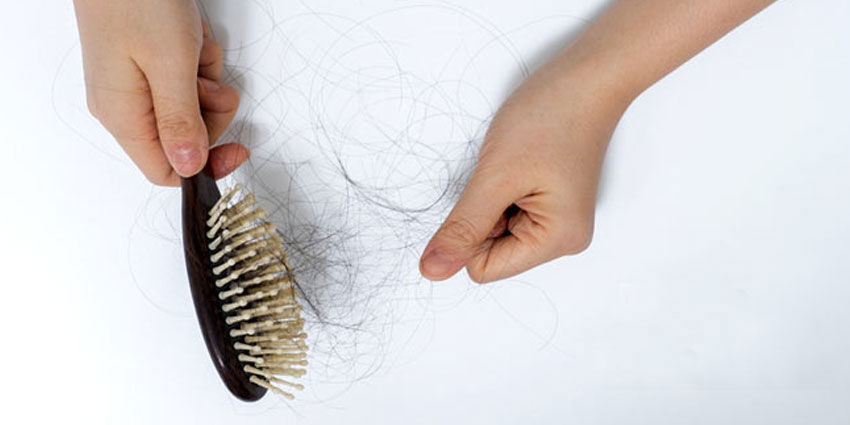

Hair Fall
There are many causes of scalp hair loss, and they do differ in men and women. Hair loss is caused due to many reasons such as lack of vitamins, minerals or iron in the body, age, pollution, heredity, stress, lack of sleep, hormonal imbalance and illness. It is said that losing about 100 hairs a day is normal. If you lose more hair then it’s an alarming sign.
Types of Hair loss:
- Alopecia Areata: Alopecia Areata is an auto immune disease which appears as a rounded patch about an inch across of hair loss, classification of Alopecia Areata is classified as follows:
- Alopecia Areata if mild patchy hair loss on the scalp
- Alopecia Totalis is loss of all scalp hair
- Alopecia Universalis is the loss of scalp and all body hair
- Androgenetic Alopecia: It accounts for 95 % of hair loss. It can affect both men and woman although men experience a much greater degree of loss. In women androgenetic alopecia appears as diffuse hair loss occurring over most of the scalp. In men however the pattern of loss usually starts with a receding hairline which then advances to thin the top of the head.
When Androgenetic Alopecia occurs, large active hair follicles in specific areas begin to change to smaller less active ones that shrink slightly with each new growth cycle. The hair shafts eventually narrow producing progressively finer hairs with each new growth cycle until eventually the hairs become transparent and stop emerging. - Anagen Effluvium (Hair loss due to chemicals or radiation): is the pathologic loss of anagen hairs, classically caused by radiation therapy to the head and systemic chemotherapy, especially with alkylating agents.
- Trichotillomania (Self induced hair loss): Trichotillomania is defined as a self-induced and recurrent loss of hair. It is classified in DSM-IV as an impulse control disorder and includes the criterion of an increasing sense of tension before pulling the hair and gratification or relief when pulling the hair. Trichotillomania has been hypothesized to lie on the obsessive–compulsive spectrum, which is proposed to encompass obsessive–compulsive disorder,
- Telogen Effluvium (Sudden or severe stress related hair loss): It is characterized by massive hair loss as a result of early entry of hairs into the Telogen. Emotional or physiological stressful events may result in an alteration of the normal hair cycle. It may be due to a variety of causes, eating disorders, fever, childbirth, chronic illness, major surgery, anemia, severe emotional disorders, crash diets, hypothyroidism, and drugs.
- Scarring Alopecia: When inflammation of the hair follicles occurs due to infection it can lead to Scarring Alopecia. It is easy to identify a case of severe Scarring Alopecia because there will be rough patches on the surface of the scalp made up of small blood vessels and connective tissue.
Balanced Approach of Dr. Anil Patil’s “Integrated Therapy” for treating hair loss:
- Start with a nutritious diet: A balanced array of nutrients is necessary to prevent hair loss and premature graying. ‘Good-for-your-hair’ foods include white sesame seeds, shredded fresh coconut, green leafy vegetables, whole grains, dates and raisins, fresh yogurt or lassi (curd milk during the day), bean sprouts, nuts and seeds and healthy fats such as Cow’s ghee or olive oil. Cook with spices that enhance digestion and purify body tissues: turmeric, black pepper, fenugreek, coriander and cumin are both are full of flavour’s and helps indigestion. Amalaki Rasayana helps digestion for all doshas. Avoid bad fats, alcohol, caffeine and nicotine.
- Eating etiquettes: Healthy eating habits are just as important for effective digestion and absorption as the diet itself. Food should be fresh and whole, and prepared lovingly. Eat with your attention on the food, in a calm and serene frame of mind, and sit quietly for five minutes after your meal to start the digestion process before dashing off to the next task of the day.
If digestive toxins build up in the body, they prevent nutrients from reaching the cells and tissues of the body. Especially after the age of forty, it is important to undergo periodic internal cleansing to flush away toxins. Triphala Rasayana is a gentle, non-depleting cleanser that can be taken every day to tone the digestive system and promote regularity. - Get plenty of sleep: 10 p.m. marks the start of the Pitta period of the night. Since Pitta dosha is related to activity, heightened digestive fire and awakened physical and intellectual energy, it is not the ideal time to try to fall asleep. Go to bed before 10 p.m., during the Kapha time of the evening, to be able to fall asleep easier and get better quality of sleep. Lack of sleep can lead to poor hair health and appearance.
- Manage stress: Ongoing high levels of mental and emotional stress can lead to falling hair, premature greying and dull-looking hair. Brahmi and Ashwagandha support your natural ability to manage stress.
Take time out to relax, and practice relaxing yoga poses and meditation to keep stress from ballooning out of control. - Hair Care: Topical nourishment can help keep your hair strong, shining and thick. The lukewarm oil head and scalp massage, especially when done with coconut oil infused with Ayurvedic herbs, nourishes the hair and scalp, alleviates dryness of scalp, enhances circulation and helps balance Vata dosha.
Coconut oil or sesame oil, infused with herbs like Amala, Brahmi, Bhringaraj or Hibiscus, helps maintain the colour and lustre of hair. It is highly advised to do the scalp massage twice or thrice a week for intensive nourishment of the hair.
Keep your hair and scalp clean to avoid itchy scalp and clogged hair follicles. Cleanse with a gentle herbal shampoo every other day. Always Use lukewarm water to wash your hair, and follow with a natural conditioner to detangle if your hair knots-up. A Neem water rinse will leave your hair soft and shiny.
Hair along for lifelong: Never comb or brush wet hair, because your hair is most vulnerable asset when it is wet. Gently run a wide-toothed comb through it when it's almost dry to remove any knots and style it into place. Whenever possible, let hair dry naturally rather than blow-drying (hair dryer) it. Trim hair regularly to take care of split ends and natural wear and tear.

